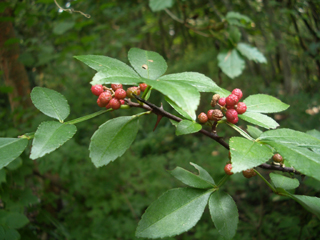Tuvaraka (Hydnocarpus laurifolia)

Description of Plant
Tejohva is medicinal native plant of North America. The English name of the plant is 'Winged prickly ash' and commonly known as 'Timur' or 'Toothache tree'. It is a small horny tree, grows up to 6 m. Its branches are nearly 1.2 cm long. Leaves appearance are very differently trifoliate with leaf stalked wings. The leaflets are ellipticto, ovate lace like, sharped and toothed. The flowers are very minute and of yellow color, arising from leaf axils. There are six to eight sepals. Petals are absent in its flowers. Male flowers contain 6 to 8 stamens with large anthers, due to which its yellow color appears. Female flowers contain 1 to 3 celled, with pale red color, splits in two ends, when gets ripe. Their fruits are beautiful, sub-globose, reddish brown and contain a single seed in the follicle. Seeds are also globose. These are of shiny black color.
General Description
Zanthoxylum alatum is a plant that is enriched with medicinal properties. In ayurveda it is known as tejohva and tumur. It is known to control two doshas, kapha and vata. Vata is known to control blood circulation, breathing, blinking, and your heartbeat. kapha is known to control supply of water to all body parts, skin ailments and immune system. So, tejohva has tendency to cure various body ailments and disorders related to digestion, circulation, immunity and skin. All the parts of plant known to have stomachic, anthelmintic and carminative properties. Fruit extracts are known to combat fever, dental problems, worms and dyspepsia because of antiseptic, deodorant and disinfectant properties. Due to their deodorant and disinfectant, helpful to ward-off flies. The bark of the tree is used for gums relief, asthma, diabetes and for snake bite.
It contains various important, active and useful biochemicals. Its stem bark contain essential oils that have monoterpenes like linalool and limonene and armatamide, an amide. The alcoholic extract of the stem bark have a new flavonoidal glycoside.
The seeds of plant contain active components like enolic acid and volatile compounds like alkanoids, flavonoids, glycosides, sterols, fatty acids, lignins, amino acids, aromatic compounds.
Its leaves contains linalool, various kinds of terpenes, ketone compounds and linolyl acetate.
These all compounds show its activity when needs. Due to these plenty of chemicals in the tejohva, it is tend to do all the actions.
Classification
- Kingdom - Plantae
- Phylum - Tracheophyta
- Class - Magnoliopsida
- Order - Sapindales
- Family - Rutaceae
- Genus - Zanthoxylum
Habitat
It is native of North America. This plant grows in India in the velleys of Himalayas at the altitude of 1000 to 2100 m, 600 to 1800m in khasi hills and in ghats of India like in Orissa and Andhra Pradesh up to 1,200 m and in minimum amount in Himalayan regions in the northeastern part of India like Naga Hills, Meghalaya, Mizoram, and Manipur.
Names
- Latin name - Zanthoxylum alatum
- English name – Toothache Tree
- Hindi name – Tejbal, Tumbura, Napali Dhaniya
- Kannada name– Tejaphal, Tumburu
- Tamil name – Tejaphalam, Tejasvini
- Telugu name – Tejasvini
- Malayalam name – Tejaphalam, Tejasvini
- U.P Hills name – Timur
- Bengali name – Nepali Dhane
- Gujarati name – Tejbal
- Punjabi name – Tirmira
- Unani name – Faaghir
- Philippines name – Chi-it
- Thailand name – Mak kak
- Arabic name – Phagir karava khandan
- Persian name – Kavava dahana kushada
Ayurvedic Properties
| Hindi / Sanskrit | English | ||
| Rasa | Katu, Tikta | Taste | Bitter, Pungent |
| Guna | Laghu, Ruksha, Tiksna | Physical Property | Light, Sharp, Dry |
| Virya | Usna | Potency | Hot |
| Vipaka | Katu | Metabolic Property (After Digestion) | Pungent |
Effects on Doshas
It is used to manage the kapha and vata ailments.
| Charak Samhita | Sushrut Samhita | Prabhava |
|
- |
- |
Ancient Verse about Tejohva

The Bhavprakash nighantu edition of 1998: verse 113-115, page no-56.
References:
The Bhavprakash nighantu with elaborated Hindi commentary by Padmashri prof. K.C. Chunekar, edited by Dr. G.S. Pandey: edition of 1998: verse 113-115, page no-56.
Practical Uses of Tejohva
External uses of Tejohva
It is known as stimulant, antiparasitic and prevents necrosis. Its powder is used as dust on wound. It is also used in headache.
The Juice of this plant is used for throat disorders, gargling in oral and dental problems.
Internal uses of Tejohva
Anti-inflammatory activity
This plant known for its anti-inflammatory action and shows significant inhibition of pro inflammatory cytokines like tumor necrotic factor and interlukin-6.
Anti- bacterial activity
It is known to counter gram positive bacteria like B. subtilis, staphylococcus aureus and gram negative bacteria like E.coli, salmonella typhi and more.
Insecticidal, mosquito repellent and larvicidal activity
It is able to enhance repellent activity against female Aedes mosquito. Its seeds oil shows larvicidal activity against the mosquito Culex, Aedes, and Anopheles.
Cure skin ailments
Fruits extracts contain various lipids which help to inhibit sensitive irritation from sun bathing, insect bites, shaving, chemical treatment and other problems.
Antioxidative activity
The ethanolic and methanolic extract of this fruits shows radical scavenging activity.
Nervine tonic
It is used as nervous system stimulant, hence useful in vata disorders like rheumatoid arthritis and paralysis.
Tonic
It is a great appetizer, liver stimulant and anthelmintic. This action is due to its calcium antagonist mechanism.
Refreshment
Its fruit can be chewed and kept in mouth for brushing in dental diseases.
Cardiac diseases
It has cardiac stimulant properties so very helpful in heart diseases. As its calcium antagonist mechanism provides base to treat cardiac diseases.
Very useful in Asthma and Cough also.
It is also act as diuretic.
It is very helpful in fever.
Parts used
Leaves, Flowers
Side Effects
Tejohva can cause light burning sensations because. of hot potency of the plant.



